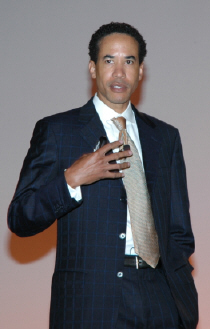Oracle's Charles Phillips: On demand is the future


He talked about the rapid adoption of Linux in the enterprise, Oracle’s contributions to the Linux community (such as kernel improvements), ISVs targeting Linux, and Linux as a foundation for enterprise grids.
Regarding enterprise grids, he noted that the Linux/Intel combination (no mention of AMD) is the foundation for scaling out grids. The attributes of grids, according to Phillips, are pay-as-you-go pricing, scaling up or out, distributing peak loads, using standard components, and high reliability (“unbreakable” in Oracle terms). "Mostly what we see is customers taking advantage of low-cost computers," Phillips said. "You can still buy a big SMP box, but not as economical and it won’t slow down innovation in Intel/Linux technology." Everyone nods their head....
Phillips pointed to an Oracle grid in Austin, Texas that uses an acre of computer space, 10,000 servers, 2.5 petabytes of storage and runs 64-bit Linux hosting Oracle eBusiness applications for customers. “The reliability is excellent and it’s some of our fastest growing business,” Phillips said. “On demand is the future of software for many years to come and we are building it on Linux.”
Phillips pitched the Oracle stack, with certified configurations, synchronized releases, factory pre-assembled and with standard component...and running Linux. "You can't do it with 50 different operating systems. You have to make choices," Phillips said. "We picked some configurations that we can test."
He told the Linux crowd what they wanted to hear: "Linux is the foundation of what we are doing." And one of the proof points, is that Oracle has an 81-percent share of the database market on Linux, followed by IBM at 17 percent (Oracle, Gartner, RDBMS numbers), and key customers like Amazon and Telsta. What about Oracle and OpenSolaris?